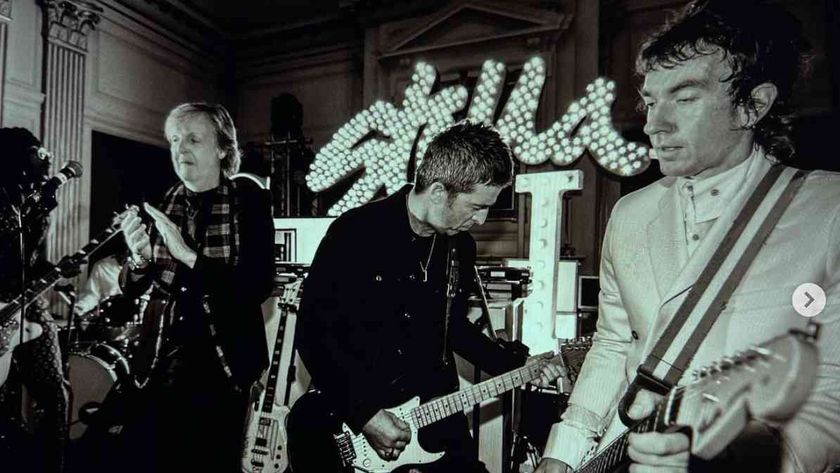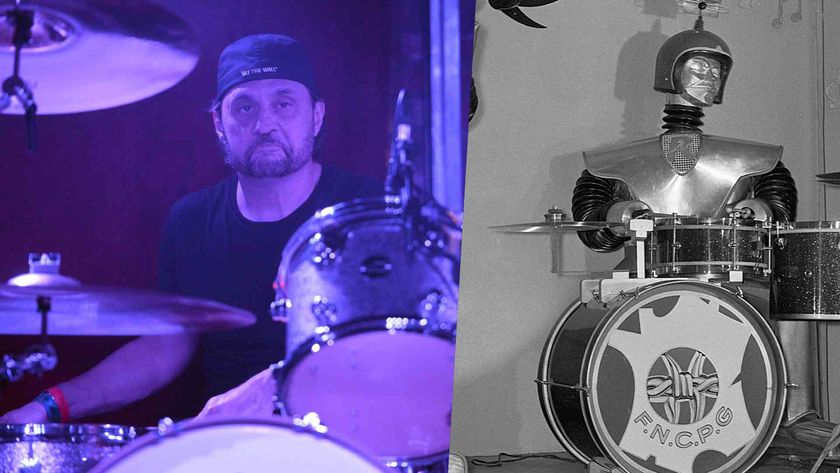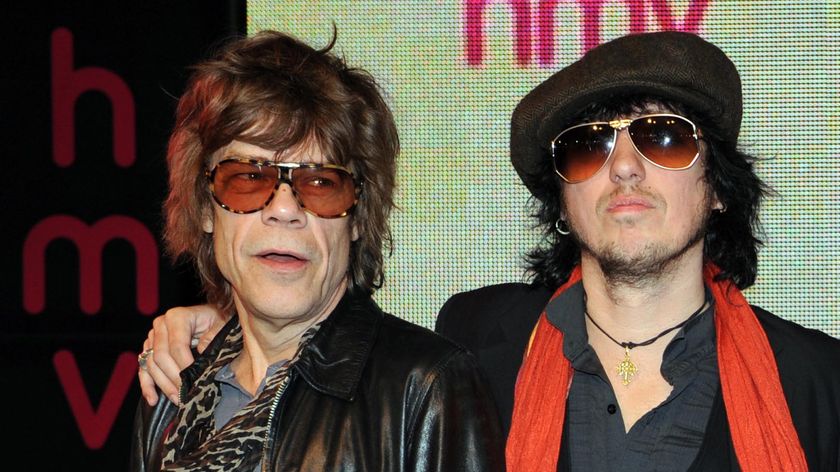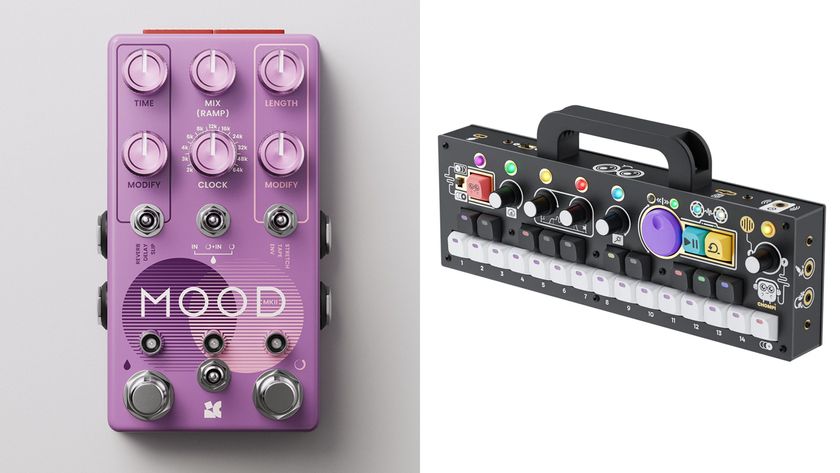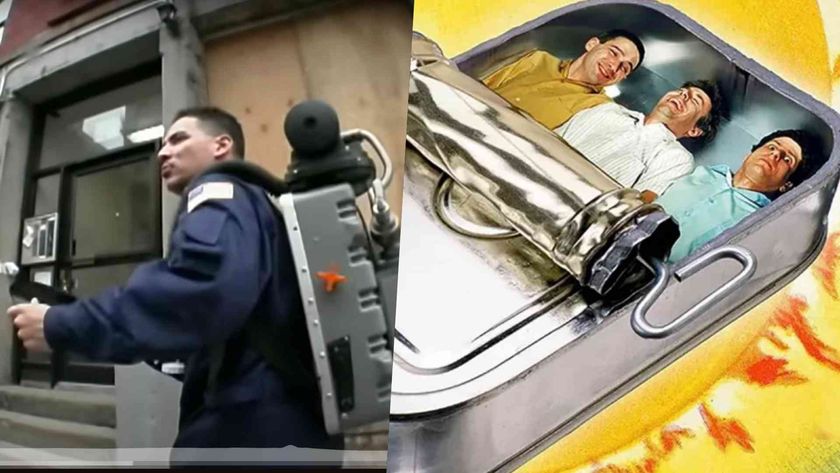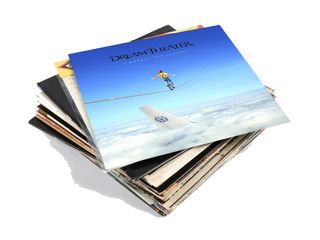
A Dramatic Turn Of Events full album preview
On Dream Theater's highly anticipated upcoming album, A Dramatic Turn Of Events, the undisputed kings of modern-day prog rock emerge from what might have been a career-threatening blow - the loss of drummer and founding member Mike Portnoy - better, stronger and more daring musically than ever.
"Going into this album, I felt a tremendous sense of responsibility," guitarist John Petrucci tells MusicRadar. "When Mike Portnoy left the band, I think it put a big question mark in the minds of a lot of fans because they saw him as a very big figure in Dream Theater. So I owed it to those people to show them that everything was grounded, intact and extremely creative within the band.
“As it was the first time I was the sole producer for Dream Theater, it presented a challenge. But I thrive on challenges – I feel as though that’s when I do some of my best work."
A Dramatic Turn Of Events also marked the first time that Petrucci contributed the bulk of an album's lyrics, an opportunity he relished. "I’ve been wanting to write an entire album of lyrics for a long time now," he says. "The process of connecting music to a message is so gratifying, especially when I have a singer like James La Brie, who can make words come to life in ways that are spine-tingling."
'Spine-tingling' is a term that can be applied to the whole of the album, MusicRadar can report after hearing an advance preview of Dream Theater's stunning new masterpiece, which sees the band - Petrucci, LaBrie, bassist John Myung, keyboardist Jordan Rudess and new drummer Mike Mangini - performing at the top of their game. Mixed by Grammy Award winner Andy Wallace (Nirvana, Rage Against The Machine), it's a sonic wonder that keeps revealing surprises even after multiple spins.
“I’m so happy when I listen to the record," says Petrucci. "We had goals in mind, and we achieved them. All of the conversations everybody had about what kind of album we wanted to make had meaning because we accomplished what we were aiming for. I only hope that everybody enjoys the record as much as I do.”
Dream Theater's A Dramatic Turn Of Events will be released on 13 September (12 September in the UK). On the following pages, John Petrucci walks us through the album track-by-track.
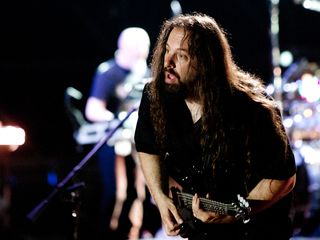
On The Backs Of Angels
“From day one it was always going to be the first track on the record. It’s also the first song that Mike Mangini really brought to life, so right there it’s special.
“I came up with the intro guitar riff while I was playing an acoustic at home by the fire. I was thinking, How should this record begin? What should be the first thing that people hear? The idea that came to me was a little bit Pink Floyd – moody, foreboding, this drifting arpeggiated guitar pattern.
“We were very conscious when writing the song that it should reflect the signature sound of the band. We wanted it to have all of the elements of Dream Theater. It would be progressive, it would be metal, and it would be melodic. There would be some big shred moments mixed with very dramatic breakdowns. It’s got everything that we love to do as a band.”

Build Me Up, Break Me Down
“This song and Bridges In The Sky were written pretty far into the album. We felt as though the record needed some balance to it, some songs that were more driving and in your face. There were many progressive elements happening already, so we wrote a couple of songs that were direct and full of attitude.
“The hook at the end of the chorus is very interesting. I sang an idea to James, but I didn’t know how he would finally go about it. Basically, I shouted the words into a microphone and sent the demo to him.
“What James wound up doing was a three-layer hook, which I totally love. The chords were already written, but he picked up on the keyboard line that was there. I should also point out the work of John Myung, who created a bass riff that he perfectly integrated into the song. John's a very quiet guy, but he always comes up with parts that knock you out.”
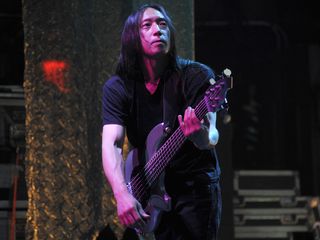
Lost Not Forgotten
“To me, it's one of the most technical songs on the album. It has a lot of twists and turns and some crazy ideas that were confusing to us as we were writing and recording. It took a while to get it all under our fingers.
“Guitar-wise, it’s the one song where I tune down to D. I thought it would sound heavier that way. And it does – I think the song kicks some serious ass!
“One of the things that was a lot of fun to do is this diminished passage of unison playing. I wrote it out and built it piece by piece, programming drums as I went. I showed it to Jordan, who said, ‘That’s crazy!’ He learned it and put a harmony to it.
“We played it for some of the people from Roadrunner who came by as we were recording, and they went crazy. One of them remarked that the diminished section was like being tickled – that feeling you get where you’re saying, ‘Stop, stop!’ but somebody keeps tickling you anyway. So we started referring to that part as ‘The Tickle Section.’
“The mood of the song always reminded me of an old-time epic film like Ben- Hur. So I wrote lyrics that are somewhat historical about this ancient Persian elite fighting force that kind of died out. Again, a good example of my love for storytelling and linking music to words.”
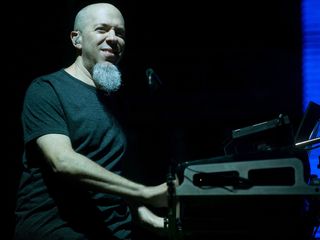
This Is The Life
“I demoed this song early on and brought it to the band. I had an idea for a ballad, but when I sent it to the guys I definitely said that I was open to anything, all thoughts and suggestions.
“I worked a lot with Jordan on bringing the middle bridge section to another place. He’s such a master at coming up with the coolest chord and melodic movements. It cascades in ways that you don’t expect, the way the chords are modulating and moving. From the demo process, we kept a Moog solo that Jordan did – I absolutely love it.
“The title came about one day when I was driving in the city with my mom. My sister was about to have a baby. So we were stopped at a light behind this pickup truck, and on the truck was a bumper sticker in Spanish that I interpreted as ‘This is the life.’ At the same time, I was playing the song for my mom. Right then, I looked at her and said, ‘That’s the title of the song: This Is The Life.’”
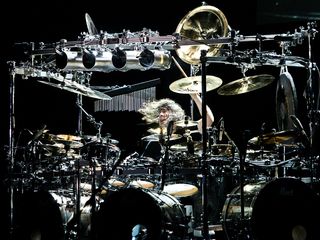
Bridges In The Sky
“A total riff factory. One of the challenges that I like to present myself with on a song like this is to try to make each riff original and unique and have them weave in and out of different syncopations. As they go by, no pass is ever the same; they’re constantly changing.
“Doing this can be tricky, because it makes everything harder to play and difficult to remember. But I think that’s ultimately what makes the song original and interesting - putting that kind of thought into it.
“The cool thing about Mike Mangini is he’s very aware musically of whatever everybody’s doing. He matches things so effortlessly. Even if it sounds like a groove is going by, he catches little rhythmic elements with his kick drums, or he’ll match fills that go in the same direction as the guitar. And he’s constantly changing things up as well. Seeing and hearing him work his magic is incredible.
“Actually, right at the end is one of the sickest drum parts I’ve ever heard. It’s like a machine gun, the intensity. When he would play it, I would be watching and listening to him, and I was in awe. ‘How is this even happening?’ I said to myself. ‘How is a human being doing this?‘ He’s remarkable.”

Outcry
“Another example of writing a song with a specific purpose. We wanted Outcry to be the anthem for the album, so it has a very strong theme, and it’s totally insane instrumentally. It’s like Dream Theater defined, but way over the top!
“I was playing a riff while we were doing drummer auditions, and it really inspired me. So I programmed the drums and played the riff over it, but I ended up changing it around quite a bit, making it larger and more anthemic.
“In a song like this, the goal for Jordan is to come up with a keyboard part that’s right out of the movies, like a big John Williams soundtrack, something that’s strong and that everybody will be able to sing and remember. Because he’s so amazing, Jordan always has five million ideas, so we tweak and work on things until the melody is right there.
“After the intro, the theme kicks in. The way it made me envision flying through the air in slow motion really influenced the lyrics, which are about the uprisings in the Middle East, people fighting against oppression.”

Far From Heaven
“This is James’ centerpiece, for sure. There is bass on the track, along with a string section, but for the most part it was written as a piano/vocal.
“Jordan and I intended it to be a ballad, but it would also be the Part 1 for the next song, Breaking All Illusions. In fact, in Breaking All Illusions, we use the themes that are in Far From Heaven. Doing that isn’t new to Dream Theater.
“For a few days James, Jordan and I worked on the vocal melodies. James had some very strong ideas, which were great. He recorded his parts up in Canada with Rich Chycki. We never did anything like that, where I as a producer wasn’t present when the vocals were being sung, so it was a bit of an experiment.
"I was blown away when I heard what they had done, not only by the vocal sound but the emotional quality that James put into it. He has such a beautifully unique voice. The way that Andy Wallace mixed it, putting James right up front, gives me shivers.”
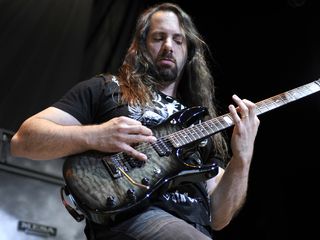
Breaking All Illusions
“It’s the Part 2 of the previous song. We specifically wanted to write a more epic piece, and when we do that, we know that we’re not bound to any sort of structure as far as verses and choruses.
“Arrangement-wise, it’s very non-traditional, so you hear a lot of breakdowns. There’s a great John Myung moment where he does an ostinatto part in the first verse. He’s going in something of a circle, and it has a real hypnotic effect, drawing everybody in.
“The song is extremely proggy, with a lot of keyboard breaks. As a guitarist, I had a great time on the section that’s very La Villa Strangiato [by Rush]. It starts out kind of bluesy, then it’s kind of jazzy, and it builds and builds. I got a chance to use so many aspects of guitar playing: phrasing and melodic elements, blues, jazz, shred. It was very satisfying to record. Alex Lifeson was definitely in my mind as I was playing.”
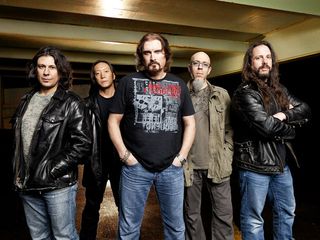
Beneath The Surface
“Beneath The Surface is the last song we wrote for the album. We had tracked all of the drums on the other cuts, and I think we were working on keyboards. At this point, we realized that the record needed something. Everything else was very intense, so a cool-down felt right.
“With the exception of This Is The Life, I was writing about very heavy topics: political unrest in America, uprisings in the Middle East, ancient Persian armies, shamans. For the closing song, a lighter, more poignant lyrical message was in order, something that would reach deep into your soul in a very honest way.
“Actually, I wrote the lyrics without the music; it was before we even went into the studio. Once we started working on the song, I had a guitar part that seemed like it would work, but I ended up changing it around. There was a bit of a process with marrying the words to the music. I demoed the song and recorded it, and the guys were totally open to it.
“It’s mostly acoustic, and it could exist as an acoustic/vocal song. We did put an arrangement to it. I really like the keyboard solo in the middle. We searched for just the right Moog-esque sound, picturing the lighters, or I guess cell phones, coming out in the audience. It takes it away from being a folkish ballad and makes it more Genesis or ELP. I love it. I think it’s a great way to end the record.”

Joe is a freelance journalist who has, over the past few decades, interviewed hundreds of guitarists for Guitar World, Guitar Player, MusicRadar and Classic Rock. He is also a former editor of Guitar World, contributing writer for Guitar Aficionado and VP of A&R for Island Records. He’s an enthusiastic guitarist, but he’s nowhere near the likes of the people he interviews. Surprisingly, his skills are more suited to the drums. If you need a drummer for your Beatles tribute band, look him up.

"Reggae is more freeform than the blues. But more important, reggae is for everyone": Bob Marley and the Wailers' Catch a Fire, track-by-track

“Part of a beautiful American tradition”: A music theory expert explains the country roots of Beyoncé’s Texas Hold ‘Em, and why it also owes a debt to the blues

"Reggae is more freeform than the blues. But more important, reggae is for everyone": Bob Marley and the Wailers' Catch a Fire, track-by-track

“Part of a beautiful American tradition”: A music theory expert explains the country roots of Beyoncé’s Texas Hold ‘Em, and why it also owes a debt to the blues


